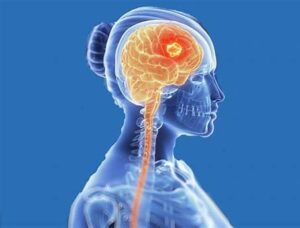Advanced Brain Cancer
 Patients with Stage 4 brain cancer have cancer that has grown and metastasized (or spread) to the nearby tissues. Tumor cells actively divide and appear very different from the normal cells. It is found that the tumors in the brain very rarely metastasize to other parts of the body, but there are greater chances that these tumors may grow and affect other parts of the central nervous system. Researchers suggest that grading brain cancer is different from other cancer as tumors in the brain are graded based on how aggressive the tumor cells appear under a microscope.
Patients with Stage 4 brain cancer have cancer that has grown and metastasized (or spread) to the nearby tissues. Tumor cells actively divide and appear very different from the normal cells. It is found that the tumors in the brain very rarely metastasize to other parts of the body, but there are greater chances that these tumors may grow and affect other parts of the central nervous system. Researchers suggest that grading brain cancer is different from other cancer as tumors in the brain are graded based on how aggressive the tumor cells appear under a microscope.
There are over 120 types of brain tumors. Below are some different brain tumor types:
- Acoustic Neuroma
- Astrocytoma:
- Grade I – Pilocytic Astrocytoma
- Grade II – Low-grade Astrocytoma
- Grade III – Anaplastic Astrocytoma
- Grade IV – Glioblastoma (GBM)
- Chordoma
- CNS Lymphoma
- Craniopharyngioma
- Other Gliomas:
- Brain Stem Glioma
- Ependymoma
- Mixed Glioma
- Optic Nerve Glioma
- Subependymoma
- Medulloblastoma
- Meningioma
- Metastatic Brain Tumors
- Oligodendroglioma
- Pituitary Tumors
- Primitive Neuroectodermal (PNET)
- Other Brain-Related Conditions
- Schwannoma
Symptoms of brain cancer depend on which parts of the brain are involved and which functional systems are affected. For example, vision problems may result from a tumor near the optic nerve. A tumor in the front part of the brain may affect the ability to concentrate and think. A tumor located in an area that controls motor function may cause weakness, numbness or difficulty with speech.
Signs of brain cancer may include:
- A headache that changes depending on the time of day and position of the head, and worsens over time
- Seizures
- Numbness
- Nausea or vomiting
- Memory loss
- Muscle weakness
- Speech difficulty
A number of treatment options are currently utilized alone or in combination to achieve optimal results. Treatment options for brain cancer include surgical options, minimally invasive surgical techniques, including endoscopy, intraoperative neuro-navigation, a brain-mapping procedure; intraoperative electrophysiology brain-mapping, also called motor mapping and language mapping; intraoperative radiation therapy (IORT); radiation therapy, including external beam radiation and whole-brain radiation; chemotherapy, including local chemotherapy and systemic chemotherapy; targeted therapy, addressing specific pathways or abnormal brain cells involved in tumor growth.
Your cancer will ultimately influence the treatments that are right for your situation. Treatment may include surgery, radiation, targeted therapy, or a combination of these treatment techniques. Multidisciplinary treatment, which uses two or more treatment types, is important for every cancer patient and will help in creating a care plan and goals for improving a chance of cure or prolonging survival. In some cases, participation in a clinical trial may provide additional options




